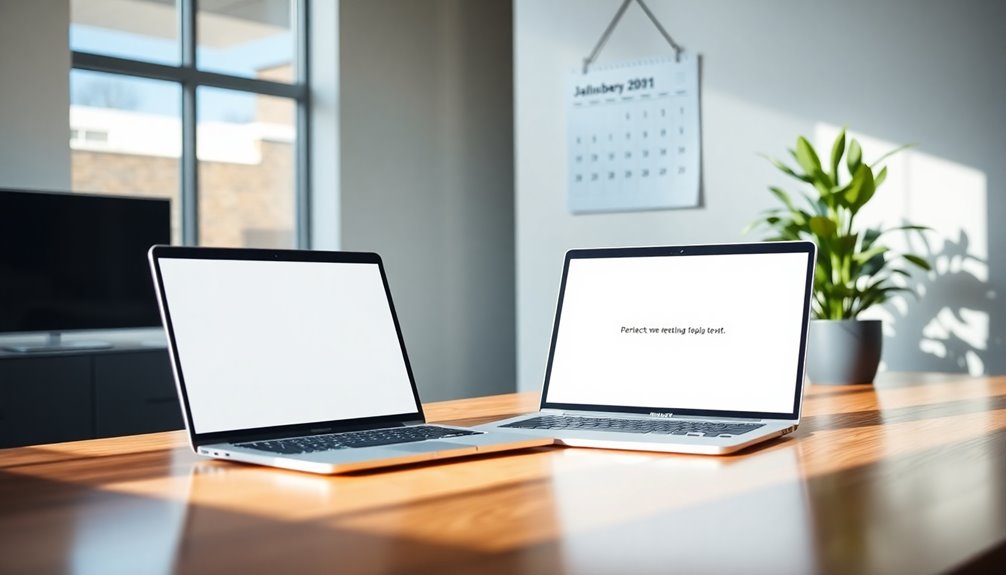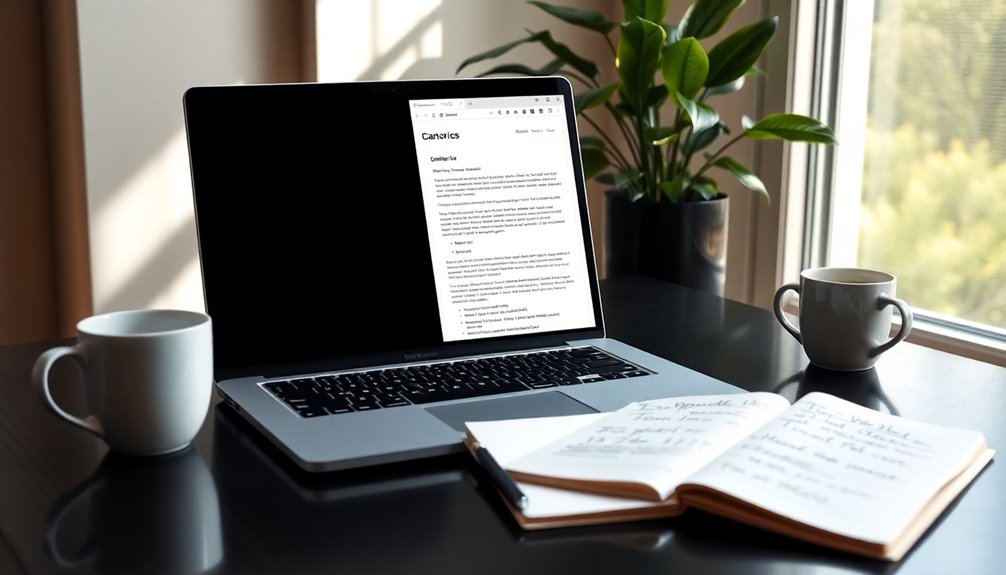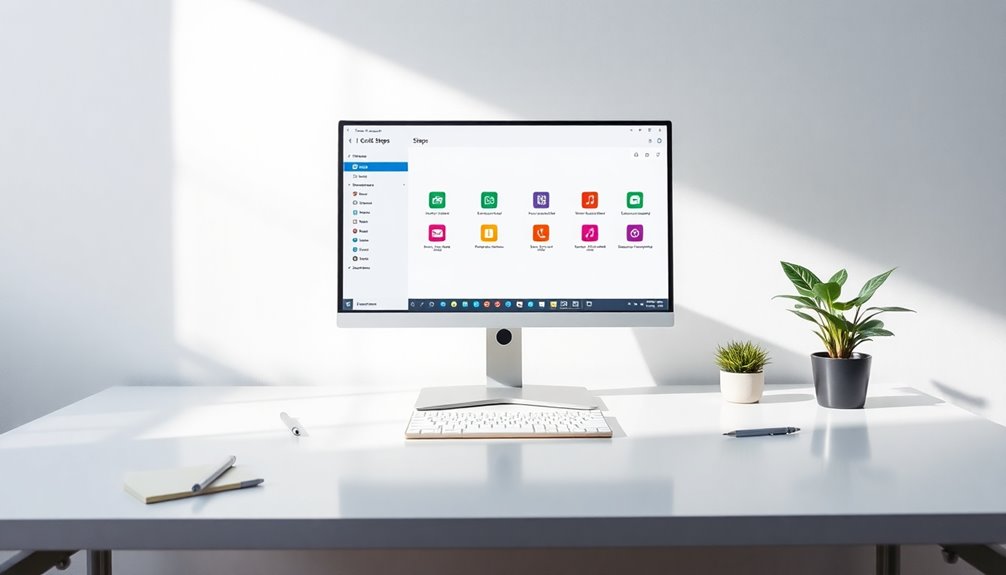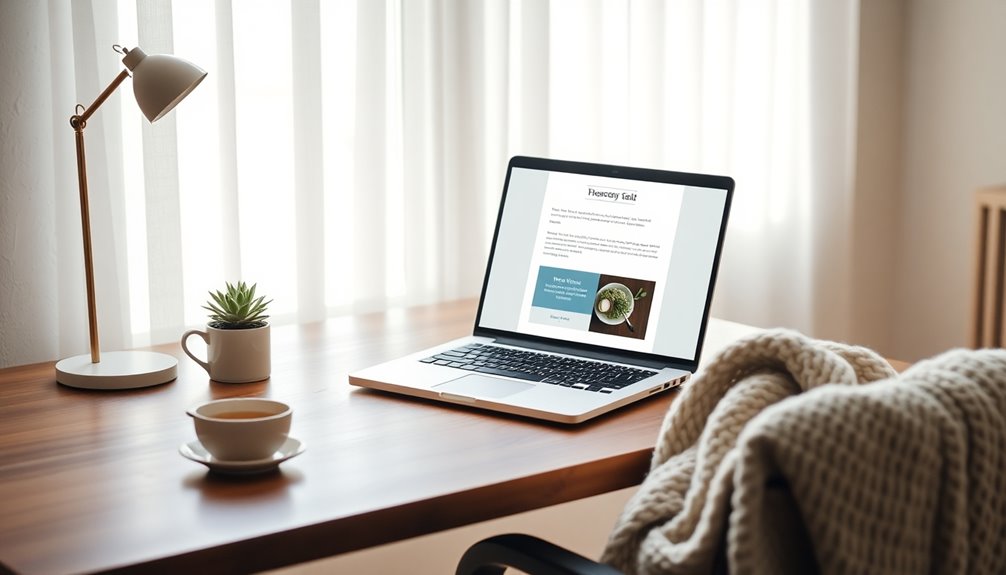When someone misses a meeting, a follow-up email is vital to keep things on track. Start with a polite greeting and briefly summarize the key points discussed. Make sure your subject line is clear, like "Follow-Up: Missed Meeting on [Date]". Propose specific dates for rescheduling and include a scheduling link to simplify the process. Keep the tone respectful and avoid any blame to maintain a positive relationship. This approach shows you value their time and contributions. If you want additional tips and a detailed template to craft your email effectively, just keep going!
Key Takeaways
- Begin with a polite greeting and acknowledge the recipient's absence without assigning blame to maintain a positive tone.
- Provide a brief summary of the meeting agenda and key discussion points to keep the recipient informed.
- Suggest specific new meeting times and include a scheduling link to facilitate easy rescheduling.
- Keep the email concise, focusing on essential information to enhance readability and engagement.
- Use a clear subject line that indicates the email's purpose, such as "Follow-Up: Missed Meeting Summary."
Introduction

Understanding the importance of follow-up communication can significantly impact your professional relationships. When someone misses a meeting, a follow-up email serves as a crucial tool to address their absence and clarify any misunderstandings. Timeliness is key; sending this email within 1-2 hours of the missed meeting enhances your chances of getting them to reschedule.
In your follow-up email, start with a polite greeting, then provide a brief summary of the meeting agenda. Highlight key discussion points to ensure the recipient has a clear understanding of what they missed.
Propose new meeting times that fit both of your schedules, making it easier for them to commit. It's vital to maintain a professional tone throughout the email. This helps prevent any potential misunderstandings and keeps the lines of communication open.
Including relevant links or documents can also add value to your email, emphasizing the importance of the missed meeting. By using effective communication channels, you not only encourage rescheduling but also reinforce the significance of maintaining strong professional relationships. Additionally, ensuring your email has a compelling subject line can increase the likelihood of a timely response.
Your approach can make all the difference in ensuring future interactions are productive and collaborative.
Maintains Professional Relationships

Maintaining professional relationships relies heavily on effective communication, especially after missed meetings. Sending a follow-up email after a missed meeting shows you respect the recipient's time and helps foster ongoing professional rapport. A well-crafted email clarifies any misunderstandings regarding the absence and reinforces the meeting's importance, preserving the relationship.
In your follow-up, it's essential to acknowledge absence without placing blame. This approach creates a supportive environment that encourages open dialogue and continued partnership. Recognizing signs of stagnation in communication can also help in addressing any underlying issues that may have contributed to the missed meeting. Additionally, professional counseling can provide tools for rebuilding communication in strained relationships.
Regular communication through follow-up emails ensures everyone stays informed and engaged, which is vital for maintaining relationships in a collaborative setting.
By proposing a new time to reschedule, you demonstrate your commitment to the partnership and a willingness to work together towards mutual goals. Clear communication in your follow-up email allows both parties to realign on objectives and expectations moving forward.
Ultimately, these efforts not only address the missed meeting but also strengthen your professional connections, paving the way for future interactions.
Clear Subject Line Importance

A clear subject line can significantly enhance the effectiveness of your follow-up email after a missed meeting. When you use a subject line like "Follow-Up on Missed Meeting – Reschedule Request," you immediately inform the recipient about the email's purpose. This clarity encourages them to prioritize your email and respond promptly.
Including keywords such as "missed meeting" not only helps the recipient understand the context but also prompts timely responses. Research shows that emails with specific subject lines have a much higher open rate, increasing the likelihood that your request to reschedule will be addressed quickly.
A well-defined subject line reinforces professionalism and shows respect for the recipient's time. It helps set the tone for the entire email, making your communication more effective.
Furthermore, subject lines that summarize the email's intent aid in organizing communications, allowing both you and the recipient to track important follow-ups and action items easily.
Crafting a Concise Subject Line

Crafting a concise subject line is essential for ensuring your follow-up email gets noticed. A clear subject line should indicate the purpose of your email, like "Follow-Up: Missed Meeting on [Date]." This straightforward approach helps the recipient quickly grasp the context and importance of your follow-up regarding the meeting topic.
Aim for brevity; keeping the subject line concise, ideally under 50 characters, guarantees full visibility in inbox previews. You might also consider personalizing the subject line with the recipient's name. For example, "Hi [Name], Following Up on Our Missed Meeting" can significantly boost engagement.
Adding a call to action, such as "Let's Reschedule," encourages the recipient to respond promptly. This not only emphasizes the importance of follow-up but also directs the conversation.
Utilizing email templates can help streamline this process, ensuring you maintain clarity while saving time.
Pro Tips for Maximizing Impact

To maximize the impact of your follow-up email, start by acknowledging the missed meeting in a friendly manner. This sets a positive tone and helps maintain rapport.
Use a clear subject line like "Follow-Up: Missed Meeting on [Date]" to convey the purpose directly.
Next, summarize the key points discussed during the meeting. Highlight their importance, reinforcing the value of the content for your recipient. This not only shows you respect their time but also encourages engagement with the material.
When it comes to rescheduling, propose specific alternative dates and times. This makes it easy for them to choose a convenient option, demonstrating your willingness to accommodate their schedule.
To further facilitate engagement, include relevant resources or attachments from the missed meeting. This provides context and helps the recipient catch up on what they missed, making them feel included in future discussions.
Common Mistakes to Avoid

Even with the best intentions, follow-up emails can sometimes miss the mark. One common mistake to avoid is using a blameful or accusatory tone. This approach can alienate the recipient and hinder future communication. Instead, focus on maintaining a positive and supportive tone. Additionally, fostering a support network can help you navigate these conversations more effectively.
Another error is sending follow-up emails during the meeting time. This can disrupt ongoing discussions and appear unprofessional. Make sure to wait until after the meeting concludes to send your email.
Keep your follow-up concise and focused on key takeaways and next steps. Overloading the email with excessive information can overwhelm the recipient and dilute your message. Limit the number of follow-up emails you send; multiple messages can come off as nagging and may frustrate the recipient.
Lastly, ensure all relevant materials and links are included in one email. This prevents cluttered communication and shows organization. Additionally, consider the importance of clear communication during separation, as it fosters a more constructive dialogue in various contexts.
Missed Meeting Follow-Up Template

A well-structured missed meeting follow-up email can significantly improve communication and collaboration. Start with a clear subject line, like "Follow-Up: Missed Meeting on [Date]," to indicate the purpose right away.
Politely acknowledge the absence without assigning blame, emphasizing that unexpected events happen.
Next, summarize the key discussion points and action items from the missed meeting to provide clarity and context. This not only reinforces the importance of the meeting but also ensures everyone is on the same page.
To facilitate rescheduling, propose specific date options or include a scheduling link. This makes it easier for the recipient to choose a time that works for them, increasing the likelihood of a prompt response.
Throughout your follow-up email, maintain a professional tone and keep your message concise. This approach helps reinforce communication and preserves professional relationships.
Final Thoughts

Crafting an effective follow-up email after a missed meeting is essential for maintaining strong professional relationships. When you send your follow-up email, aim to do so within 1-2 hours of the missed meeting. This time frame reinforces the meeting's importance and encourages prompt engagement.
In your email, include a clear summary of the meeting agenda and key discussion points, along with proposed next steps. This ensures the recipient understands the value of rescheduling, enhancing communication and accountability.
Utilizing scheduling tools can also simplify the process; by providing multiple rescheduling options, you reduce friction and make it easier for them to choose a new time.
Always maintain a polite tone throughout your email. A respectful approach fosters professional rapport and prevents any feelings of alienation.
Frequently Asked Questions
How Do You Politely Email Someone Who Missed a Meeting?
To politely email someone who missed a meeting, start with a friendly greeting, acknowledge their absence, summarize key points discussed, suggest rescheduling options, and maintain professionalism and clarity throughout your message for effective communication.
What to Say to Someone Who Missed an Appointment?
If someone missed an appointment, acknowledge their absence kindly. Share what was discussed, offer to reschedule, and invite them to express any challenges they faced. This fosters understanding and keeps communication open between you both.
How Do You Write a Follow up Email After No Response to a Meeting?
After no response to a meeting, you should send a polite follow-up email. Mention the meeting's importance, summarize key points, and suggest new times, making it easy for them to reschedule.
What to Say to Someone Who Missed an Event?
It's important to acknowledge their absence kindly. Briefly recap what they missed, suggest rescheduling, and highlight how their participation is valued. Keeping communication clear and concise will encourage a positive response and future engagement.








